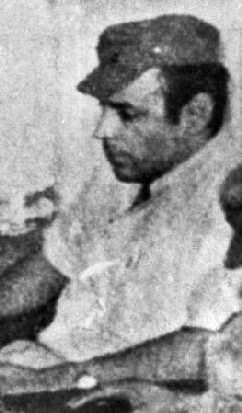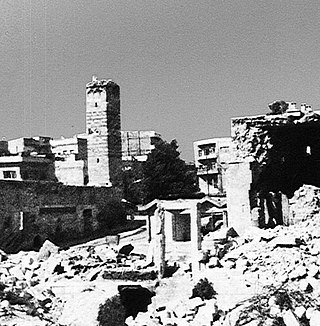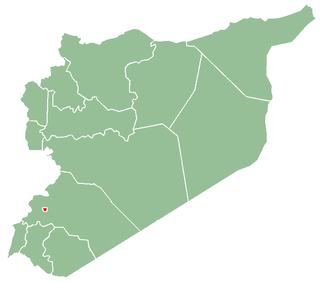
The Abu Nidal Organization, officially Fatah – Revolutionary Council, was a Palestinian militant group founded by Abu Nidal in 1974. It broke away from Fatah, a faction within the Palestine Liberation Organization, following the emergence of a rift between Abu Nidal and Yasser Arafat. The ANO was designated as a terrorist organization by Israel, the United States, the United Kingdom, Canada, the European Union and Japan. However, a number of Arab countries supported the group's activities; it was backed by Iraq from 1974 to 1983, by Syria from 1983 to 1987, and by Libya from 1987 to 1997. It briefly cooperated with Egypt from 1997 to 1998, but ultimately returned to Iraq in December 1998, where it continued to have the state's backing until Abu Nidal's death in August 2002.

Sabri Khalil al-Banna, known by his nom de guerreAbu Nidal, was a Palestinian militant. He was the founder of Fatah: The Revolutionary Council, a militant Palestinian splinter group more commonly known as the Abu Nidal Organization (ANO). Abu Nidal formed the ANO in October 1974 after splitting from Yasser Arafat's Fatah faction within the Palestine Liberation Organization (PLO).

Patrick Oliver Cockburn is a journalist who has been a Middle East correspondent for the Financial Times since 1979 and, from 1990, The Independent. He has also worked as a correspondent in Moscow and Washington and is a frequent contributor to the London Review of Books.

Bashar al-Assad is a Syrian politician who is the 19th and current president of Syria since 2000. In addition, he is the commander-in-chief of the Syrian Armed Forces and the secretary-general of the Central Command of the Arab Socialist Ba'ath Party. He is a son of Hafez al-Assad, who was President of Syria from 1971 to 2000.
The National Progressive Front is a pro-government coalition of left-wing parties in Syria that supports the Arab nationalist and Arab socialist orientation of the government and accepts the "leading role" of the ruling Arab Socialist Ba’ath Party. The coalition was formed on the basis of the Popular Front model of the Socialist Bloc, through which Syrian Ba'ath party governs the country by permitting nominal participation of smaller, satellite parties. The NPF is part of Ba'ath Party's efforts to expand its support base and neutralize prospects for any sustainable liberal or left-wing opposition, by instigating splits within independent leftist parties or repressing them.

Bassel al-Assad was a Syrian engineer, colonel, equestrian and politician who was the eldest son of Syrian President Hafez al-Assad and the older brother of (later) President Bashar al-Assad. It was widely expected that he would succeed his father as President of Syria until he died in a car crash in 1994.

Riad Reda Al Solh was the first prime minister of Lebanon after the country's independence. Solh was one of the most important figures in Lebanon's struggle for independence, who was able to unite the various religious groups. He is considered one of the founders of Lebanon.

The Hindawi affair was a failed attempt to bomb El Al Flight 016, from London to Tel Aviv in April 1986 by Nezar Nawwaf al-Mansur al-Hindawi, a Jordanian citizen.
Terrorism in Syria has a long history dating from the state-terrorism deployed by the Ba'athist government since its seizure of power through a violent coup in 1963. The Ba'athist government have since deployed various types of state terrorism; such as ethnic cleansing, forced deportations, massacres, summary executions, mass rapes and other forms of violence to maintain its totalitarian rule in Syria. The most extensive use of state terrorism in the 21st century was the extensive state deployed violence against civilians during the 2004 Qamishli massacre.

The al-Assad family, also known as the Assad dynasty, is a Syrian political family that has ruled Syria since Hafez al-Assad became president of Syria in 1971 under the Ba'ath Party. After his death, in June 2000, he was succeeded by his son Bashar al-Assad.
Morris Sigel Seale was a Jewish born scholar and theologian who wrote about Jewish, Christian and Muslim traditions and explored extensively the links between the religions. He wrote three influential books and contributed numerous articles to Theological journals including the Journal of Biblical Literature and The Muslim World.

Nick Paton Walsh is a British journalist who is CNN's International Security Editor. He has been CNN's Kabul Correspondent, an Asia and foreign affairs correspondent for the UK's Channel 4 News, and Moscow correspondent for The Guardian newspaper.

The Corrective Movement, also referred to as the Corrective Revolution or the 1970 coup, was a bloodless coup d'état led by General Hafez al-Assad on 13 November 1970 in Syria. Assad proclaimed to sustain and improve the "nationalist socialist line" of the state and the Ba'ath party. Ba'ath party adopted an ideological revision, absolving itself of Salah Jadid's doctrine of exporting revolutions. The new doctrine placed emphasis on defeating Israel, by developing the Syrian military with the support of the Soviet Union. Assad would rule Syria until his death in 2000, after which he was succeeded by his son Bashar al-Assad.

The Islamist uprising in Syria comprised a series of protests, assassinations, bombings, and armed revolts led by Sunni Islamists, mainly members of the Fighting Vanguard and, after 1979, the Muslim Brotherhood, from 1976 until 1982. The uprising aimed to establish an Islamic republic in Syria by overthrowing the Ba'athist government, in what has been described by Ba'ath Party as a "long campaign of terror".

The 1986 Damascus bombings were a series of terrorist attacks perpetrated in Damascus, Syria in 1986. They were the deadliest acts of terrorism against civilians since the quelling of the Islamist uprising in Syria in 1982. The bombings appeared to be aimed at destabilizing the Syrian government under Hafez al-Assad with links being between the suspected perpetrators and Iraq.
Gilles Jacquier was a French photojournalist and reporter for France Télévisions. Jacquier worked as a special correspondent for Envoyé spécial, one of France's best known documentary programs which airs on France 2. He had a successful career, has covered major international military conflicts and won many awards during his life. He was killed on 11 January 2012 while covering the ongoing Syrian Civil War in Homs, Syria. Jacquier was the first Western journalist killed in Syria since the beginning of the Syrian Civil War.

Al Mayadeen is a Lebanese pan-Arabist satellite news television channel based in the city of Beirut. Launched on 11 June 2012, it has news reporters in most of the Arab countries. In the pan-Arabist television news market, it competes against Qatar-owned Al Jazeera and Saudi-owned Al Arabiya, and also against Sky News Arabia and BBC News Arabic. At the time it was founded, most of the channel's senior staff were former correspondents and editors of Al Jazeera.

Dorothea Noelle Naomi "Thea" Porter was a British artist, fashion designer and retailer who in the 1960s brought opulent Middle East fashions to London.

The Chief of the General Staff of the Army and Armed Forces is the professional head of the Syrian Armed Forces and the Syrian Army. The Chief of the General Staff is appointed by the President of Syria, who is the commander-in-chief of the Armed Forces.















